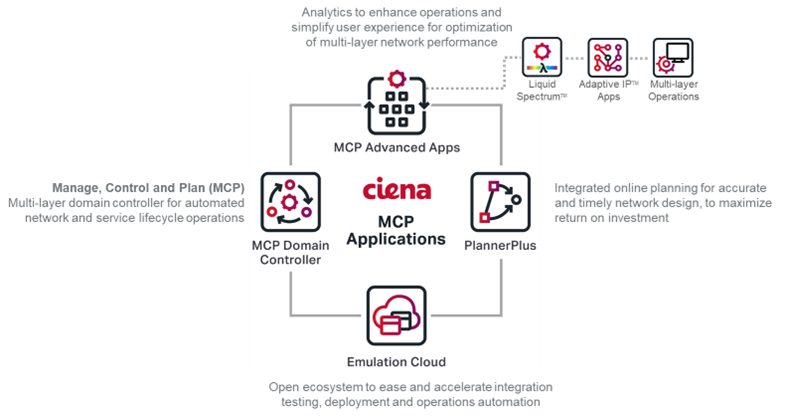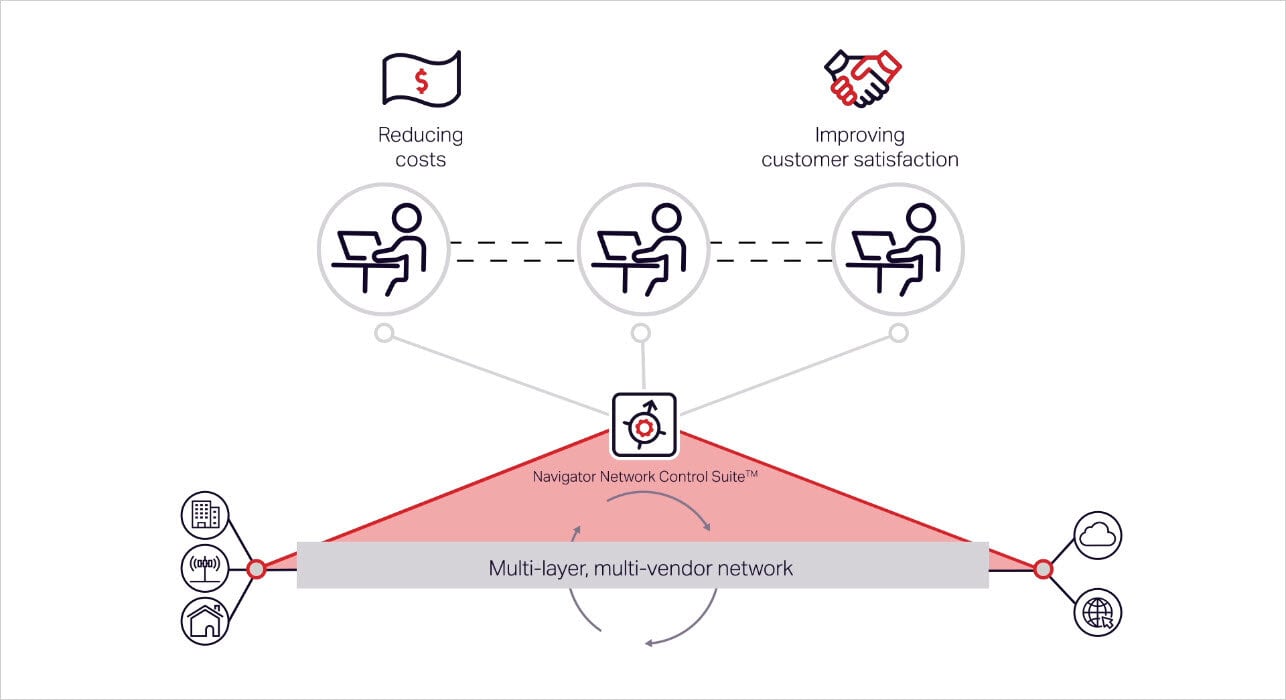MCP is an Intelligent Network Controller. What does that really mean?
Ciena’s Manage, Control and Plan (MCP) is now known as Navigator Network Control Suite. You can learn more about it here.
The concept of a software controller is well-accepted in the telecoms industry. The requirement for a central point of management was initially addressed in the 80s by network management systems (NMS) performing essential fault, configuration, accounting, performance, and security (FCAPS) tasks, and has since evolved to software-defined network (SDN) controllers that enable automation through open APIs. Now, into the mix comes ‘intelligent network controller’. Is this just packaging up the same stuff under a different name, or is there something substantial behind this? There definitely is substance and value.
In a nutshell, Intelligent Network Control with Ciena’s Manage, Control and Plan (MCP) Applications, now known as Navigator Intelligent Apps, delivers a full multi-layer, L0 through L3, software control solution within a single controller platform. This includes coverage of Passive Optical Networks (PON) through to multi-vendor IP. Plus MCP includes integrated analytics apps to best guide operational actions.
Our innovation required rebuilding decades of FCAPS and NMS tool functionality onto a new architecture and leveraging that common platform to deliver a rich toolset of L0 through L3 applications (since you cannot have a single controller unless it does network management fundamentals).
It means that operators only need one upgrade of a single integrated controller in order to deliver new functionality
This accomplishment alone is industry-leading since it means that operators only need one upgrade of a single integrated controller to deliver new functionality – not multiple upgrades of a myriad of application-specific PON, DWDM, IP, etc. controllers, which are all stitched together via APIs that need to be tested and verified before deployment, and with every upgrade of every controller. With MCP, there is one control software package and a single point of upgrade. Nice.

Figure 1: Ciena’s MCP Applications combine analytics and software control across multiple layers to deliver holistic intelligent network control
Intelligent Network Control decomposes into three key building blocks inside MCP:
- Intelligent – MCP understands network applications based on use cases that are supported and services that are deployed, not on individual network devices. For example, an intelligent network controller enables the creation of a leaf spine switch composed of multiple physical hardware devices and can provision services, examine alarms and performance metrics (PMs), and do software and firmware upgrades on the aggregate configuration. Such a configuration is suitable inside data centers or for universal broadband access. An intelligent network controller sees the configuration of switches for what it is used, and manages it as a complete entity, not just a bunch of boxes requiring the network team to understand and manage the complexity.
- Network – MCP manages the complete network infrastructure from L0 through L3 and delivers applications and insights based on the whole, not just per individual layers. For example, MCP can plan traffic-engineered IP routes using detailed knowledge of both the IP and L0 Shared Risk Link Group (SRLG) information. This ensures true diversity when needed and is available within the MCP solution – no additional controllers or boxes are required. This ‘a network is all the layers’ philosophy applies to all the tools and capabilities within MCP and enables rapid implementation of both new tools as well as APIs to deliver aggregated actionable insights to third-party automation platforms.
- Control – MCP controls each functional layer with fine granularity for comprehensive lifecycle operations. Auditing, trending, optimizing and planning control capabilities exist at each layer within MCP, as well as holistically multi-layer (see above!). For example, Segment Routing Traffic Engineering (SR-TE) tunnels can be audited to ensure diversity, automatically identify any issues, provide alternate solutions to remedy any diversity failures, and push those actions into the network. Control means having real-time knowledge of the network and service state and executing actions to bring that state into an optimal configuration. Just having tools to identify issues or provision services is of limited value without tying it all together in an end-to-end loop: use knowledge to proactively uncover insights and identify issues, and act to improve the network performance.
Ciena reinforces the ‘intelligent’ nature of our controller by providing the Ciena Emulation Cloud (CEC) - a set of cloud-based tools that allow customers to use a real instance of MCP to manage network elements, deploy services, run applications, etc, all within a virtual sandbox. Hundreds of technical videos are available within the CEC to deliver insights on how to accomplish simple or complex network operations workflows.
Knowledge of the capabilities of the Intelligent Network Control platform is key to both understanding the power of the solution as well as leveraging that power to deliver tangible value in customer deployments. Ciena is at the forefront of network control innovation and with MCP’s current and planned capabilities, we expect to stay there for quite a while.





